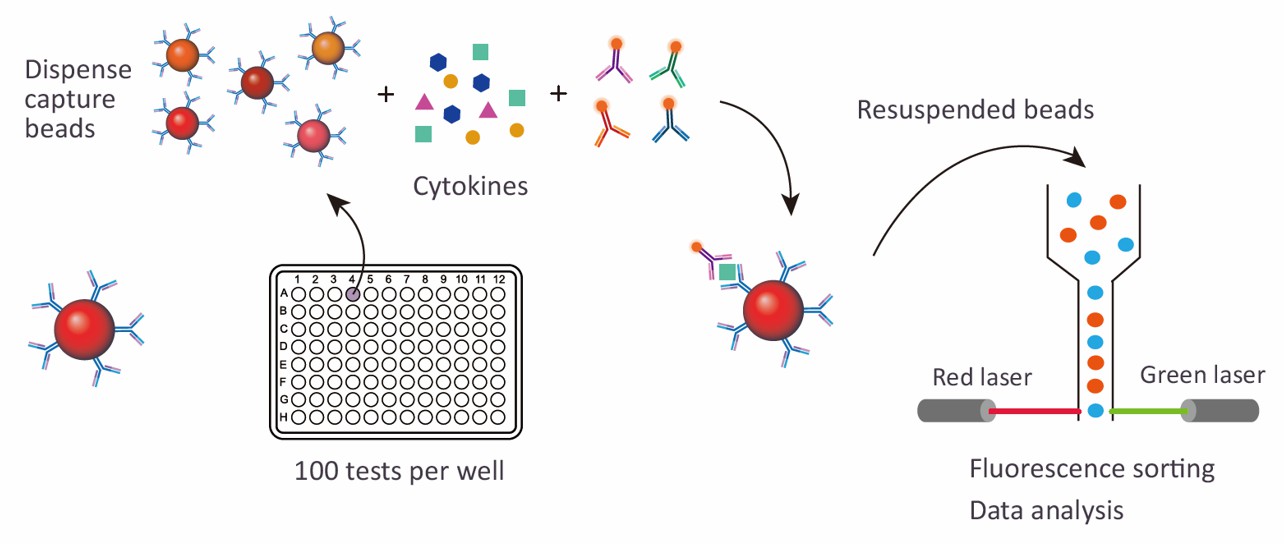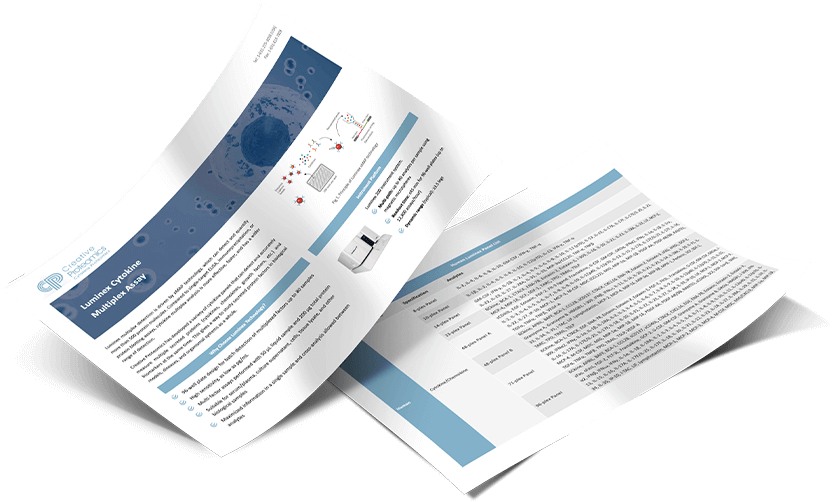- Services Overview
- Analytes Details
- FAQ
What is Cytokine Storm?
A human cytokine storm is an intense immune response marked by the rapid and excessive release of pro-inflammatory cytokines, essential proteins that regulate immune functions. When this process becomes dysregulated, it can lead to systemic inflammation and significant tissue damage. Cytokine storms are commonly triggered by infections, especially viral ones such as influenza and COVID-19, as well as autoimmune disorders and certain therapeutic treatments. This dysregulation initiates a cascade of inflammatory responses, potentially resulting in severe conditions like acute respiratory distress syndrome (ARDS) and multi-organ failure.
Understanding cytokine levels provides insights into the inflammatory environment, helping researchers decipher the underlying mechanisms of various diseases. Early and accurate cytokine profiling can inform the development of targeted therapies, enhancing treatment strategies. Additionally, investigating cytokine dynamics aids in biomarker discovery, contributing to the advancement of research methodologies. Such analyses also support vaccine development by evaluating immune responses and optimizing formulations. Overall, the analysis of cytokine storms plays a vital role in advancing scientific knowledge and improving therapeutic approaches in immunology and related fields.
Human Cytokine Storm Panel at Creative Proteomics
The Human Cytokine Storm 21-plex Panel at Creative Proteomics provides an advanced solution for analyzing key pro-inflammatory cytokines involved in severe immune responses. Utilizing Luminex xMAP technology, this 21-plex panel enables the simultaneous detection and quantification of critical cytokines, offering valuable insights into inflammatory processes.
Designed for researchers in immunology and related fields, this panel supports the understanding of cytokine dynamics and their implications in various diseases. By facilitating the exploration of cytokine interactions, the human cytokine storm panel is an essential resource for advancing research and developing targeted therapeutic strategies.
Detection Method
Magnetic bead-based Luminex multiplex assay
Species
Human
Analytes Detected
| Species | Specification | Protein Targets | Applications | Price |
|---|---|---|---|---|
| Human | Human Cytokine Storm 21-plex Panel | G-CSF, GM-CSF, IFN alpha, IFN gamma, IL-1 beta, IL-2, IL-4, IL-5, IL-6, IL-8, IL-10, IL-12p70, IL-13, IL-17A, IL-18, TNF alpha, TNF beta, IP-10 (CXCL10), MCP-1 (CCL2), MIP-1 alpha (CCL3), MIP-1 beta (CCL4) | Suitable for analyzing inflammatory responses, immune regulation, and cytokine storm dynamics | +Inquiry |
Advantages of the Human Cytokine Storm Luminex Assay
- Multiplex Analysis: Simultaneously measure up to 21 cytokines from a single 0.5 mL sample, maximizing efficiency and minimizing sample volume.
- High Sensitivity and Specificity: Achieve sensitivity levels as low as 0.1 pg/mL for many cytokines, with specificity rates exceeding 95%, ensuring reliable and reproducible results.
- Broad Dynamic Range: Detect cytokine concentrations spanning from 0.1 pg/mL to over 10,000 pg/mL, accommodating a wide variety of biological samples and conditions.
- Comprehensive Data Support: The accompanying software includes built-in statistical analyses and graphical representations, providing insights that enhance data interpretation and understanding of cytokine interactions.

Sample Requirements for Human Cytokine Storm Luminex Panel
| Sample Type | Required Volume | Notes |
|---|---|---|
| Serum | 0.5 – 0.65 mL | Use snap-cap microcentrifuge tubes. |
| Plasma | 0.5 – 0.65 mL | Use snap-cap microcentrifuge tubes. |
| Cell Culture Supernatant | 0.5 – 1.0 mL | Use snap-cap microcentrifuge tubes. |
| Whole Blood | 1.0 – 2.0 mL | Collect in appropriate anticoagulant tubes. |
| Tissue Homogenate | 0.5 – 1.0 mL | Ensure proper homogenization for analysis. |
| Urine | 1.0 – 5.0 mL | Collect in sterile containers. |
| Saliva | 1.0 – 2.0 mL | Collect in sterile containers. |
| Bronchoalveolar Lavage (BAL) | 0.5 – 1.0 mL | Collect in sterile containers. |
| Cerebrospinal Fluid (CSF) | 0.5 – 1.0 mL | Collect in sterile containers. |
| Other Biological Fluids | 0.5 – 1.0 mL | Consult for compatibility. |
Labeling
- Labeling Format: Label tube lids with the first letter of your last name followed by consecutive numbers (e.g., S1, S2, S3 for "Smith"). Keep a record of which number corresponds to each sample.
- Label Guidelines: Use a permanent marker only; avoid stickers or labels, as they may detach when frozen. Do not seal tubes with Parafilm. Labels that do not follow the specified format will incur a $3.00/sample fee.
Shipping Instructions
- Packaging: Place samples in a rack box or cardboard/plastic sample box, then enclose this in a leak-proof bag with absorbent material. Do not place tubes directly in dry ice.
- Shipping Conditions: Ship samples on Monday or Tuesday with a minimum of 12-15 lbs of dry ice. Indicate the consignee for duties/taxes, declare a value of $1.00, and specify species and sample type on both the waybill and commercial invoice.
- Infectious Samples: Deactivate infectious samples prior to shipping.
- Precious Samples: For irreplaceable samples, we recommend using a courier service like World Courier.
Application of Human Cytokine Storm Panel
- Inflammatory Research: Investigate the role of cytokines in various inflammatory diseases, such as sepsis, autoimmune disorders, and chronic inflammatory conditions.
- Infectious Disease Studies: Analyze cytokine profiles in response to viral, bacterial, and fungal infections, aiding in understanding immune responses and disease progression.
- Therapeutic Development: Support the evaluation of novel therapies targeting cytokine pathways, facilitating the development of treatments for cytokine release syndromes and related conditions.
- Biomarker Discovery: Identify potential biomarkers for disease diagnosis and prognosis by profiling cytokine levels in patient samples.
- Vaccine Response Assessment: Evaluate immune responses to vaccines by measuring cytokine production, informing the development and optimization of immunization strategies.
In addition to preconfigured panels, we also offer customized analysis services. You can customize your own panel through our customization tool, or directly email us the targets you are interested in. A professional will contact you to discuss the feasibility of customization. We look forward to working with you!
| Protein Target | Description |
|---|---|
| G-CSF | Stimulates the production of granulocytes and stem cells, playing a key role in immune response regulation. |
| GM-CSF | Promotes the differentiation and proliferation of white blood cells, crucial for immune defense and inflammation response. |
| IFN alpha | A type of interferon involved in antiviral defense and modulation of immune responses. |
| IFN gamma | Critical for activating macrophages and enhancing immune response to pathogens, also involved in inflammation regulation. |
| IL-1 beta | A pro-inflammatory cytokine that plays a major role in the immune response, particularly during infection and injury. |
| IL-2 | Important for T-cell proliferation and regulation of immune tolerance. |
| IL-4 | Involved in regulating humoral immune responses by promoting the differentiation of B cells and influencing inflammation. |
| IL-5 | Promotes the growth and differentiation of eosinophils, playing a key role in allergic reactions and parasitic infections. |
| IL-6 | A multifunctional cytokine involved in inflammation, immune response, and hematopoiesis, often elevated during cytokine storms. |
| IL-8 | Acts as a chemoattractant for neutrophils, contributing to inflammation and immune cell recruitment to infection sites. |
| IL-10 | An anti-inflammatory cytokine that helps regulate immune responses by inhibiting the release of pro-inflammatory cytokines. |
| IL-12p70 | Promotes the differentiation of T cells and enhances the activity of natural killer cells, important for pathogen defense. |
| IL-13 | Plays a role in allergic reactions and asthma by promoting IgE production and influencing airway remodeling. |
| IL-17A | A pro-inflammatory cytokine involved in autoimmune and inflammatory conditions by recruiting neutrophils to sites of infection. |
| IL-18 | Enhances the activity of natural killer cells and T cells, playing a role in immune defense against intracellular pathogens. |
| TNF alpha | A major pro-inflammatory cytokine involved in systemic inflammation and immune system regulation, frequently elevated in cytokine storms. |
| TNF beta | Also known as lymphotoxin, it is involved in the regulation of immune responses and contributes to inflammation and tissue destruction. |
| IP-10 (CXCL10) | Acts as a chemoattractant for immune cells and is important for the recruitment of T cells to sites of infection and inflammation. |
| MCP-1 (CCL2) | A chemokine that recruits monocytes to sites of inflammation and plays a key role in immune responses and tissue remodeling. |
| MIP-1 alpha (CCL3) | A pro-inflammatory chemokine that recruits and activates macrophages and other immune cells, crucial during immune responses to infections. |
| MIP-1 beta (CCL4) | Works alongside MIP-1 alpha to recruit immune cells to sites of infection, playing an important role in inflammatory and immune responses. |
How does the Luminex technology used in this panel compare to other methods?
Luminex technology offers several advantages over traditional ELISA methods. It allows for multiplexing, enabling the simultaneous measurement of multiple cytokines from a single sample, which significantly saves time and sample volume. Additionally, Luminex assays typically provide a broader dynamic range and enhanced sensitivity, which can be crucial for detecting low-abundance cytokines in complex biological samples. This technology minimizes the variability seen in single-analyte assays and provides more comprehensive data for cytokine profiling.
Are there specific storage and handling recommendations for samples prior to analysis?
Yes, proper handling and storage of samples are critical to maintaining their integrity. Samples should be processed and aliquoted promptly after collection to avoid degradation. Serum and plasma samples should be stored at -80°C for long-term storage. It's essential to avoid repeated freeze-thaw cycles, which can lead to the loss of cytokines. When shipping samples, ensure they are packed with sufficient dry ice to maintain a temperature below -70°C, and follow specific labeling guidelines to prevent errors.
Can the Human Cytokine Storm Panel be customized for specific research needs?
Yes, Creative Proteomics offers the option to customize the Human Cytokine Storm Panel based on specific research requirements. Researchers can select additional cytokines of interest to analyze, tailoring the panel to their study's focus. This flexibility allows for a more targeted approach in exploring specific inflammatory pathways or responses relevant to a particular disease or condition. For customization, researchers can reach out directly to our team to discuss their needs and explore the available options.

